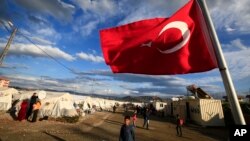German Chancellor Angela Merkel will use a visit to Turkey this weekend to try to soothe tensions over a deal meant to stem the flow of migrants to Europe, as questions about its effectiveness and long-term viability mount.
The pact, which came into force almost three weeks ago, aims to help end the chaotic arrival of migrants and refugees on the Greek islands, many fleeing war and poverty in the Middle East and Africa. More than a million reached Europe last year.
The deal initially slowed the numbers of new arrivals to Greece sharply, but boats are coming again at a rate of about 150 a day after a hiatus, indicating the "hermetic sealing" of the route appears to be over, the International Organization for Migration (IOM) said on Friday.
Merkel will pay a one-day visit with European Council President Donald Tusk to Gaziantep near the Syrian border on Saturday, where the two leaders are expected to go to a refugee camp for Syrians and meet Prime Minister Ahmet Davutoglu.
There is much at stake for both sides. Merkel lobbied skeptical European partners to back the deal, under which Turkey agreed to take back migrants who cross the Aegean Sea illegally, and is under political pressure at home to show progress.
Davutoglu sold the deal to the Turkish public partly on the basis that Turks would win quicker visa-free travel to Europe in return, a pledge that now could go unfulfilled, at least by the June deadline he had wanted.
Merkel's visit also comes as she faces criticism at home for allowing a German comedian to be prosecuted for insulting Turkish President Tayyip Erdogan.
"It is both sides that have a strong interest in making this work. Turkey wants support in easing the refugee burden - both financial support and in terms of numbers. And they want visa liberalization. We have other interests," a Merkel aide said. "Ultimately it will depend on both sides fulfilling the criteria they need to. If that doesn't happen the deal won't work. Whether it's sustainable is not clear yet."
Under the agreement, Ankara gets more EU funding for refugees living on its soil and the revival of long-stalled EU accession talks, as well as the quicker visa liberalization, the main prize in the eyes of many Turks.
But European Commission President Jean-Claude Juncker said this week that Turkey must meet all 72 conditions for visa-free travel and the EU would not water down its criteria, rebuffing a warning from Davutoglu that Turkey would no longer need to honor the deal if the promises were not met.
"Merkel is coming tomorrow to soothe both sides," said Elif Ozmenek, a migration expert at the Ankara-based USAK think tank. "There have been harsh statements from the EU, and on the other side Davutoglu has threatened to cancel deals. Merkel's trip is a 'let's continue the friendship' kind of visit."
Comedian
But it is a rocky friendship. Erdogan put Merkel in a difficult position by demanding that Germany press charges against a comedian who recited a sexually crude satirical poem about the Turkish leader on a German public
broadcaster last month.
Merkel's decision to let prosecutors pursue a case against Jan Boehmermann for mocking Erdogan angered many Germans, who saw it as a sop to an authoritarian leader.
"As much as Davutoglu is trying to make this work, Erdogan seems to be going out of his way to test the limits of what he can get away with," a senior German official said."He is showing that he can do anything he wants, testing our reactions. That will be very difficult to handle. You can see that in Merkel's handling of Boehmermann. This will be with us for the next weeks and months."
Rights groups and some European politicians had already accused the EU of compromising its principles by striking the deal with Turkey at a time when its record on freedom of expression appears to be deteriorating.
"Europe must set clear limits to its concessions ... Our freedoms, including freedom of expression, will not be part of political bargaining with any partner. This message must be heard also by President Erdogan," Tusk wrote in an op-ed published in several European newspapers on Friday.
A senior Turkish government official said the Boehmermann case was likely to be discussed during Merkel's visit, but that the main focus would be on relations with the EU and implementing the migrant deal, including how a promised 3 billion euros ($3.4 billion) in funding would be spent.
"There is an important acceleration in the relationship between Turkey and the EU, and we know that Merkel is taking a serious initiative in this," the official said.
"We may not be able to say there is total agreement on everything between Turkey and the EU, but it is clear that there is common will ... We're not expecting a troublesome visit."
($1 = 0.8877 euros)





